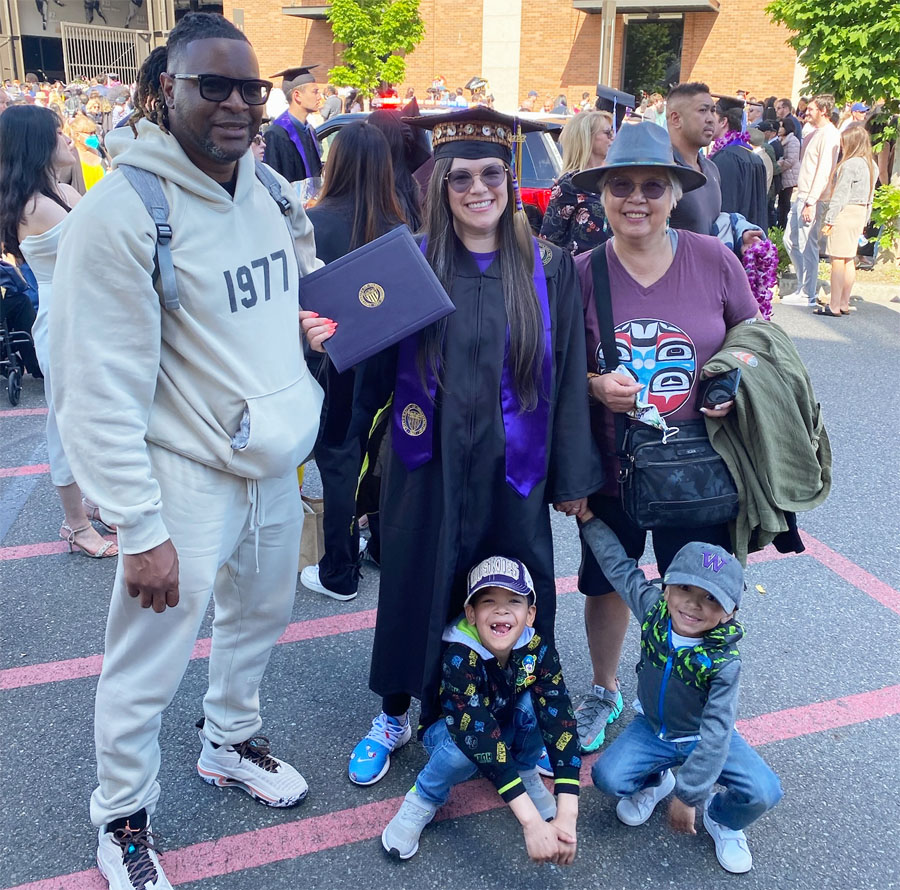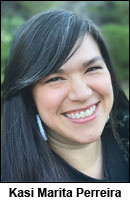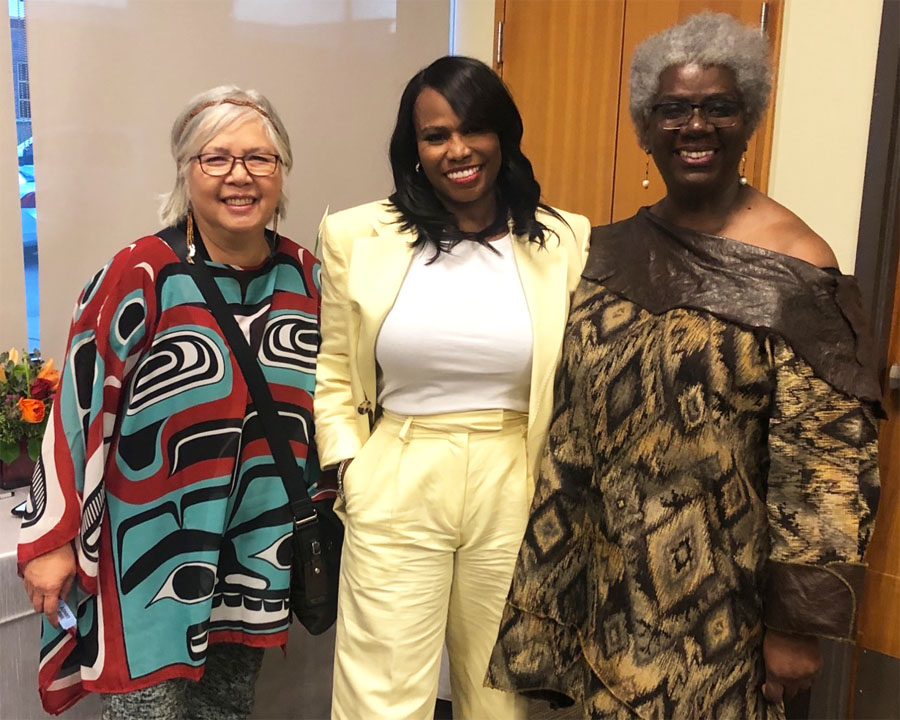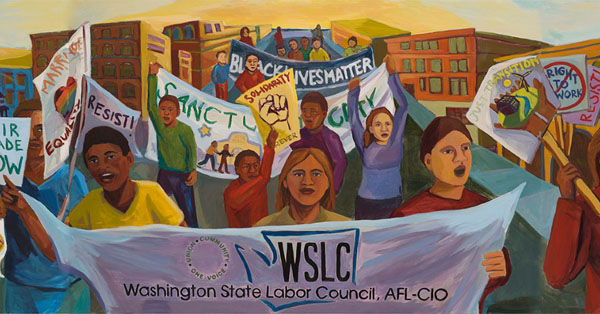OPINION
My 20-year degree: Labor Studies come in many forms
By KASI MARITA PERREIRA
(Oct. 17, 2022) — Earlier this spring, I had the opportunity to meet students in “Class, Labor and American Capitalism,” Professor James Gregory’s class at the University of Washington. It was my first time back on campus since the pandemic hit, returning as a proud graduate.
It took me 20 years to finish my degree in 2021, a Bachelor of Arts in History with Minors in American Indian Studies, Diversity, and Labor Studies, and I just finished paying off my student loans (shout out #cancelstudentdebt). The experience inspired me to think about the importance of all forms of education and the many teachers I have had over the course of my life, inside and outside the classroom.

Kasi and her family at University of Washington commencement, June 2022.
Students from the class sent dozens of questions in advance, many of which inspired this article, but the best gift they gave me was the feeling that I had a story to tell. As a returning student, I was one of more than 1 million people in the state of Washington who had “some college but no credential” in 2020, which is nearly 1 in 7 people living in our state. With increasing inequality since the pandemic hit and workers organizing now more than ever, one thing I know for certain is that everyone who survived the COVID-19 pandemic deserves love and compassion no matter what path they choose.
For example, this single Labor Studies class at UW included an organizer with local abolitionist groups, a Starbucks worker who had a union election with their coworkers the following week (they won! Learn more at #nocontractnocoffee) and a workforce development staff person with the United Indians of All Tribes Foundation. I was both in awe and feeling my full auntie status by the end of the class. It was awesome.
One of the questions submitted by a student: “Women, but especially women of color, experience imposter syndrome at every level in the workforce. Do you find yourself experiencing this in your role? How do you think the concept of imposter syndrome has kept women and BIPOC individuals from participating in labor movements?”
As a queer woman of color in the labor movement, I very much identified with this question. April Sims, President-elect of the Washington State Labor Council, AFL-CIO (along with incoming Secretary-Treasurer elect Cherika Carter), not only gave me the opportunity to work at WSLC as the first Director of Racial and Gender Justice, but also helped me work through several moments of doubt.
During one of my first weeks at WSLC in 2020, she passed along some advice that a mentor of hers had shared: imagine a younger version of you is in the room, and focus on speaking to them. This is yet another example of how the leadership of Black women can inspire and liberate everyone to be the best versions of ourselves. So, this article is dedicated to 18-year-old Kasi, who lived and experienced so much and didn’t know what to do with her power at the time.
I started at UW in 2001 fresh out of Franklin High School: two years after marching in the 1999 WTO protest in Seattle and less than one month after 9/11. My original shero, my mama, Rhonda Farrar (now Poh-Poh or Geiwú) and aunties Patricia Sullivan and Cynthia Edwards with UFCW paved the way for members and organizers like me. They encouraged me to stay involved and volunteer with my union, but also encouraged me to learn more about other unions in the area.
UW Labor Studies, then led by Professor Margaret Levi, offered Service Learning opportunities with local unions, and I was fortunate to work with OPEIU Local 8, whose President was Verlene Jones-Davis at the time. As the first Black woman to lead our union as well as countless other labor organizations, Miss Verlene was a force in Seattle’s labor movement — her daughter Kristen continues her legacy as a member leader with UFCW 3000 today.
In 2003, my life was changed forever. Two years after starting at UW, my hard-working father, who also struggled with addiction, got very sick. He was hospitalized for about a year at the UW Medical Center, where my mom spent every day with him, while I kept up with my classes, three jobs, and making sure our home and pets in South Seattle were okay. My dad passed during finals week. I was able to finish that quarter, but never did bounce back and had a couple failed attempts at finishing my last credits. In many ways, work was my escape at the time, and I found in the labor movement that you could work around the clock and there would still be more work to do.
After years of volunteering and part-time work, I started as a full-time organizer with UFCW 21 under the leadership of Dave Schmitz and Diane Zahn. There I met thousands of workers from across the country who changed my life and taught me many life lessons on organizing drives such as Smithfield in Tar Heel, North Carolina; Walmart workers from San Leandro, California and Phoenix, Arizona, and workers on the cutting edge of health care who formed a union at CHI Virtual Health Services right here in Tacoma.
Time after time I witnessed young and old, Black and white, Filipina and Latina/o/x workers leading the way and winning against some of the largest corporations in the world. I think about Evelin Cruz and Mary Watkines, who are now looking out for us as beloved ancestors. I also met the love of my life through organizing and have started a family of our own little freedom fighters.
Now at the WSLC, I help to advance the work of our Race & Labor initiative first begun in 2015: connecting the dots between racial justice and economic justice for all working people. We start by acknowledging labor’s roots in the exclusion of people by race and gender and not shying away from this shared history. Just as important, we highlight stories of cross-racial solidarity and include a call to action, connecting with campaigns that are happening across the state that build power for all working people by centering those most impacted. Learn more here.
For every union member, worker leader, and student activist that is fighting for a better tomorrow: Yee tu yéi yatee (“You have the answers within you” – a Tlingit version of “Sí se puede”). I wish internship programs like Harry Bridges Center’s Building a Movement (led by Yasmin Ahmed) and WSLC’s Union Summer (led by Cherika Carter) existed when I was in school, showing Washington’s unions how an investment in future activists benefits our movement overall.
Today, we are writing the labor history of tomorrow. Please stay connected with Harry Bridges Center and share your ideas on how we can support current and future students at UW!
 Kasi Marita Perreira is the Director of Racial and Gender Justice for the Washington State Labor Council, AFL-CIO. She can be contacted at kperreira@wslc.org. This column was originally published by the Harry Bridges Center for Labor Studies, University of Washington.
Kasi Marita Perreira is the Director of Racial and Gender Justice for the Washington State Labor Council, AFL-CIO. She can be contacted at kperreira@wslc.org. This column was originally published by the Harry Bridges Center for Labor Studies, University of Washington.







